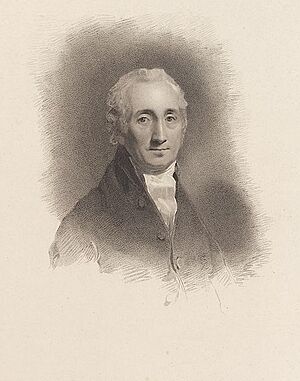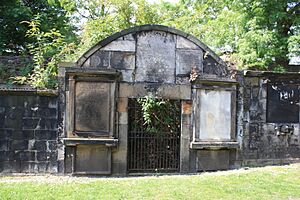Alexander Fraser Tytler, Lord Woodhouselee facts for kids
Alexander Fraser Tytler, Lord Woodhouselee (born October 15, 1747 – died January 5, 1813) was an important Scottish lawyer, judge, writer, and historian. He was a professor of history at the University of Edinburgh.
Contents
Life of Alexander Fraser Tytler
Alexander Tytler was born in the Old Town of Edinburgh, Scotland. His father, William Tytler, was also a writer and lawyer. Alexander went to school in Edinburgh and London. He then studied law at the University of Edinburgh. He became a lawyer, also known as an advocate, in 1770.
In 1780, he started teaching history at the University of Edinburgh. He became the main professor of history there in 1786.
Later, in 1790, he became the Judge Advocate of Scotland. This was a senior legal role. In 1802, he became a judge in the Scottish Courts. He was given the special title Lord Woodhouselee.
Tytler was also a friend of the famous Scottish poet Robert Burns. Tytler even convinced Burns to change some parts of his poem "Tam o' Shanter" that were critical of lawyers and church leaders.
He retired from his judge role in 1811. Alexander Fraser Tytler died in Edinburgh in 1813. He was buried in Greyfriars Kirkyard, a historic cemetery in Edinburgh.
Tytler's Family
In 1776, Alexander Tytler married Ann Fraser. They had several children. Their sons included:
- Patrick Fraser Tytler, who became a traveler and historian.
- James Fraser Tytler, who became a lawyer.
- Alexander Fraser Tytler, who worked as a judge and writer in India.
- William Fraser Tytler, who was also a lawyer and historian.
Ideas on Translation
Tytler wrote an important book about how to translate texts. It was called Essay on the Principles of Translation (1791). In this book, he shared his ideas on what makes a good translation.
He believed that a good translation should do three main things:
- It should fully show the original ideas from the first text.
- It should also keep the same style as the original text.
- It should read easily, almost like it was written in the new language from the start.
Some people believe that a famous Chinese translator, Yan Fu, was inspired by Tytler's ideas.
Views on Democracy
In his lectures, Alexander Tytler shared his thoughts on democracy. He believed that a "pure democracy" was not truly possible. He thought that all governments, in their basic form, were like a monarchy, where one person or a small group holds power.
When he talked about the ancient Athenian democracy, he pointed out that many people were enslaved. He also said that even the free people were often divided into groups. These groups followed leaders who gained power by using money and public funds.
Tytler felt that people in a republic or democracy might think they have power, but he saw this as misleading. He argued that leaders are chosen through elections, but these elections are often influenced by the leaders themselves. He believed that people then have to follow these leaders, giving up their freedom, just as they would under a king.
He thought that the idea of a perfect democracy was a dream, not something that could really exist. Tytler believed that people are naturally driven by a desire for power. He felt that individuals often work for the public good mainly to become important themselves.
However, Tytler did admit that democracy could lead to great acts of virtue by individuals. He thought that because democratic governments have many challenges, people need to be very virtuous to overcome them.
Tytler also believed that democratic governments, like those in ancient Greece and Rome, naturally change over time. He thought they would start with strong values but eventually become corrupt and decline. He said that strong patriotism is highest in new nations. But as a nation becomes rich and powerful, this strong spirit tends to fade away. He believed it was a natural rule that as a nation grows in wealth, its heroic virtues would decline.
Works by Alexander Fraser Tytler
- (1771). Piscatory Eclogues, with other Poetical Miscellanies of Phinehas Fletcher.
- (1778). The Decisions of the Court of Sessions, supplementary volumes to Lord Kames's Dictionary of Decisions.
- (1782). Plan and Outline of a Course of Lectures on Universal History.
- (1784). Essay on the Life and Character of Petrarch, with Translation of Seven Sonnets.
- (1788). Life and Writings of Dr John Gregory.
- (1791). Essay on the Principles of Translation.
- (1792). The Robbers: A Tragedy, translation of Schiller's Die Räuber.
- (1798). A Critical Examination of Mr. Whitaker's Course of Hannibal over the Alps.
- (1799). Ireland Profiting by Example, a political pamphlet.
- (1800). Essay on the Military Law and the Practice of Courts-Martial.
- (1801). Elements of General History, Ancient and Modern (an extended version of his 1782 lectures).
- (1801). Essay on Laura and Petrarch.
- (1807). Memoirs of the Life and Writings of the Honourable Henry Home of Kames.
See Also
- Playfair cycle
- Translation theory
- Strauss–Howe generational theory
- Dynastic cycle, Chinese history
General:
- Cyclical theory
- Social cycle theory
- Societal collapse
- Anacyclosis
 | Dorothy Vaughan |
 | Charles Henry Turner |
 | Hildrus Poindexter |
 | Henry Cecil McBay |



